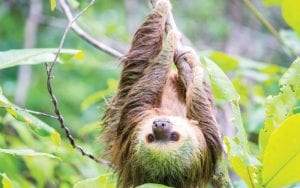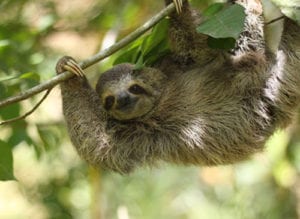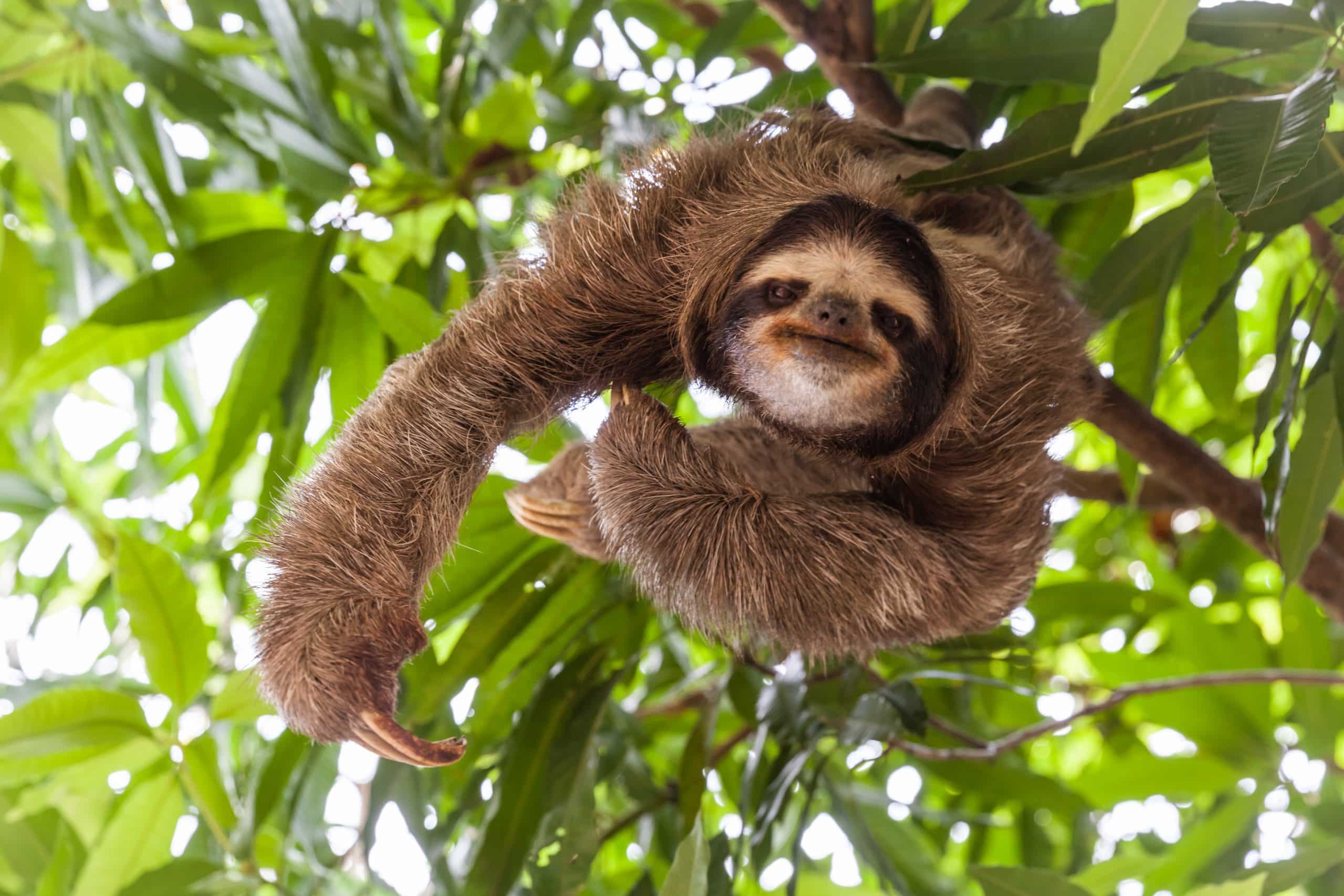BEST COSTA RICA ADVENTURE DEALS
In July 2021, the universally popular sloth was officially designated as a national symbol of Costa Rica. Of all the country’s ideally representative icons, none are more endearing than the loveable slow-moving creature with its somewhat alien appearance and the cute smile.
People come from all over the world in hopes of seeing sloths in Costa Rica. Not all sloths are alike, but both three-toed and two-toed species are found here. What’s the difference, other than the obvious extra toe? Find out in this Howler article.
With no shortage of interesting and surprising facts about sloths, it’s easy to understand why these engaging creatures captivate the attention of people seeking to view them.
First of all, they really are extremely slow. In fact, their pinnacle pace of 0.25 kph makes them the slowest mammal on the planet.
On many more counts, sloths are among the most extreme animals on the planet, and not just due to the fact they poop only once a week.
 Arboreal adaptations
Arboreal adaptations
Sloths do everything in their tree habitats except poop. They sleep, mate, and even give birth upside down.
And, as you may expect, that calls for some excessive adaptations. They were given unique tendons of their hands, which lock into place. And, together with their long, hooklike fingernails, permit them to hold easily. You would think that hanging upside down would cause a head rush. Their circulatory system incorporates a unique system of values that prevents the pooling of blood within the head.
Their mission to poop poses the most dangerous times in the life of a sloth. Descending from the tree once a week puts them at extreme risk of attack by predators. The chance they take by moving to the ground needs to count. They lose about 30% of their weight when they go. Leaving their pile is also a call-out for a mate.
Though the sloths look cuddly, their fur is very coarse and harbors its own ecosystem within. Being in the rainforest causes them to be wet much of the time. This causes algae to grow on a sloth’s fur, providing more camouflage in the treetops. Several types of bugs also inhabit their fur, including cockroaches, beetles and a particular moth species only found on a sloth.
A fascinating medical research discovery is that the fungi on a sloth’s fur has properties proven to combat breast cancer cells, and also to prevent malaria.
Discover more fun facts in this related Howler article about zany sloths, published when their national mascot status was still unofficial.

Well-deserved honor
The sloth is a worthy recipient of designated national symbol honors. Single-handedly, it may be Costa Rica’s best ambassador to the world, beckoning more tourists to our little gem on the planet. The official designation also augments the importance of sloths being a protected species. Many wonderful groups of people in this country rescue sloths, then rehabilitate and release them if possible.
Come, enjoy a hike through the forest and you might be lucky enough to see a sloth. High in the tree, the slightest movement will be its giveaway. Otherwise, the ability to blend in so well makes it easy for people to miss seeing sloths. It’s a good idea to hire a knowledgeable guide, who can assist you in spotting them.
Browse howlermag.com’s vast collection of Travel & Adventure articles to discover where sloth sightings are possible, including the “hidden sloth island” of Bijagua Ranas.Right click on the photo to “save as”. Download and color.JTNDaWZyYW1lJTIwc3JjJTNEJTIyaHR0cHMlM0ElMkYlMkZ3d3cuamlnc2F3cGxhbmV0LmNvbSUyRiUzRnJjJTNEcGxheSUyNmFtcCUzQnBpZCUzRDA0MDQxOGQxOTllZCUyNmFtcCUzQnZpZXclM0RpZnJhbWUlMjIlMjBzdHlsZSUzRCUyMndpZHRoJTNBMTAwJTI1JTNCaGVpZ2h0JTNBMzAwcHglMjIlMjBmcmFtZWJvcmRlciUzRDAlMjBhbGxvd2Z1bGxzY3JlZW4lM0UlM0MlMkZpZnJhbWUlM0U=JTNDYSUyMGhyZWYlM0QlMjJodHRwcyUzQSUyRiUyRmNsaWNrLmxpbmtzeW5lcmd5LmNvbSUyRmxpbmslM0ZpZCUzRGRyUWMxSyUyQU54VHclMjZvZmZlcmlkJTNEMzU4MTExLjE4NzU5NzMzOTE4JTI2dHlwZSUzRDIlMjZtdXJsJTNEaHR0cCUyNTNBJTI1MkYlMjUyRnd3dy5jYWZlYnJpdHQuY29tJTI1MkZnb3VybWV0LWNvZmZlZSUyNTJGY29zdGEtcmljYW4tbWVkaXVtLXJvYXN0LWhhYml0YXQtc2xvdGglMjIlM0UlM0NJTUclMjBib3JkZXIlM0QwJTIwc3JjJTNEJTIyaHR0cCUzQSUyRiUyRnd3dy5jYWZlYnJpdHQuY29tJTJGc2l0ZWltZyUyRnByb2R1Y3RzJTJGdGlsZSUyRmNvc3RhLXJpY2FuLWhhYml0YXQtc2xvdGgtd2hvbGUtYmVhbi1jb2ZmZWUtZnJvbnQtdmlldy5qcGclMjIlMjAlM0UlM0MlMkZhJTNFJTNDSU1HJTIwYm9yZGVyJTNEMCUyMHdpZHRoJTNEMSUyMGhlaWdodCUzRDElMjBzcmMlM0QlMjJodHRwcyUzQSUyRiUyRmFkLmxpbmtzeW5lcmd5LmNvbSUyRmZzLWJpbiUyRnNob3clM0ZpZCUzRGRyUWMxSyUyQU54VHclMjZiaWRzJTNEMzU4MTExLjE4NzU5NzMzOTE4JTI2dHlwZSUzRDIlMjZzdWJpZCUzRDAlMjIlMjAlM0U=







